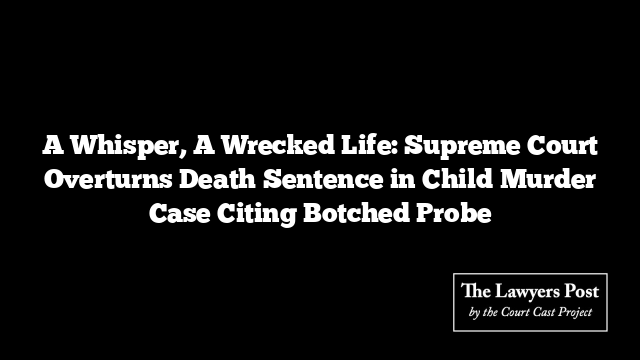Twelve years. Six of them under the shadow of the gallows. All undone by a single sentence: “I was tensed up.” That, according to India’s highest court, was the fulcrum on which a man’s life wrongly tilted toward a death sentence — a sentence now overturned.
In a searing judgment, the Supreme Court acquitted a man accused of the 2013 rape and murder of a three-year-old girl, calling the investigation “flawed and tainted” and declaring the so-called confession used to convict him as “inherently weak” and legally unreliable.
The case hinged on what prosecutors called an extra-judicial confession — a casual remark made by the accused to his supervisor after he failed to show up for work. When questioned about his absence, the man allegedly said he was feeling “tensed up.” That phrase became the noose. But the apex court saw it differently.
A bench of Justices Vikram Nath, Sanjay Karol, and Sandeep Mehta examined the record and found troubling inconsistencies. The supervisor, who later claimed the statement was an implicit confession, never mentioned it in his formal statement under Section 164 Cr.P.C. before a magistrate. Only later, at trial, did this claim surface — what the court called an “improved version.”
“If the accused truly confessed, the natural response would’ve been immediate disclosure to the police,” the court reasoned. “Instead, silence prevailed until the courtroom.”
That delay — along with a witness statement not recorded until nearly two weeks after the alleged conversation — unraveled the prosecution’s story.
The judgment went further. It said the witness’s account was riddled with contradictions and embellishments, stripping it of credibility. The so-called confession, the judges concluded, should never have formed the backbone of a death sentence.
But this wasn’t the only thread the court pulled. The entire fabric of the prosecution’s case, they said, was stitched together with “conjectures and surmises.” The witnesses who allegedly last saw the child with the accused failed to alert investigators during the crucial early hours of the case — despite police officers frequently canvassing the area.
“Their conduct,” the judgment noted, “suggests ulterior motives.”
Among those named as key witnesses were the child’s father and several locals. All were referenced in the spot panchnama — the document detailing the crime scene. But their actions, or rather inactions, raised red flags. If they truly saw the accused with the girl, why stay silent when the area was swarming with police?
Ultimately, the court declared the entire case against the man unsustainable. No trustworthy confession. No credible last-seen evidence. Just a man languishing for over a decade — half of it beneath the looming shadow of a hangman’s rope.
“Innocence,” the judgment implied, “needs more than whispers and hindsight to be undone.”
The man now walks free — not because the crime wasn’t monstrous, but because justice cannot be built on broken testimony, delayed revelations, and a prosecution that seemed more eager to close a case than to uncover the truth.
How can a system atone for years lost to silence and speculation? The court didn’t say. But it did what it could: it set the record — and a man — free.





